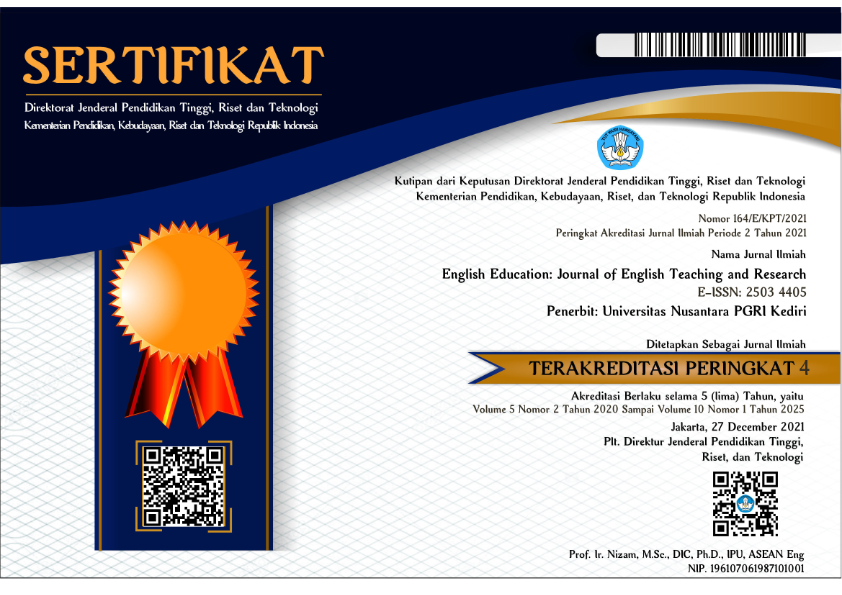Effectiveness of an after-school English program at a community childcare center in Korea
DOI:
https://doi.org/10.29407/jetar.v6i2.16475Keywords:
community children centre, effectiveness, english program, online survey, satisfactionAbstract
Community childcare centers in Korea are established mainly for students from low-income family for the purpose of protecting and educating children in the community. English program is one of the most important program at the centers. This study investigated the effectiveness of an after-school English program at a community childcare center in a region of Seoul, Korea. Students registered in this English program were encouraged to participate in an online survey using a google form to fill out the questionnaire via a computer or mobile phone. Survey questions included effectiveness of the program, students’ satisfaction, and most helpful class activity for learning English. A semi-structured interview was conducted to gather students’ views on the program. Nine students among who completed online survey and volunteered for interview. Collected survey data were statistically analyzed using SAS Enterprise Guide 7.12. Final survey data set includes 11 respondents. The overall satisfaction with the after-school English program was high for both contents and effectiveness. High school students and student who participated in the program for more than six months chose the free conversation activity as the most helpful. The mean score for debates was the highest among all activities for English writing. The survey provided an opportunity for students to report their levels of satisfaction with the program. Results of this study indicate that students are satisfied with the English program at the community childcare centers overall and, that the performance of the lecturer can be categorized very well. This study provides insights into the need and direction of English education for students from low-income families. This study will serve as a basis to develop specialized and quality English programs for successful English learning of low-income students, and facilitate the continuous improvement process.
Downloads
References
Brown, H. D. (2001). Teaching by principles. Addison Wesley Longman, Inc.
Byun, Sung-Hwan, and Sim, Kyung-Soo. (2016). The study on the factors influencing on the quality of service of community child care center workers: focusing on office environment and job satisfaction. Korean Journal of Care Management. 21:51-75.
Choi, Kyung-Hwa. (2013). A study on the needs and satisfaction of youth programs according to the types of community childcare centers. Unpublished master’s thesis, Ulsan University, Ulsan, Korea.
Ellis, R. (2013). Language Teaching Research & Language Pedagogy. Wiley Blackwell.
Goldschmidt, P., & Huang, D. (2007). The long-term effects of after-school programming on educational adjustment and juvenile crime: A study of the LA’s BEST after-school program. Los Angeles: University of California, Los Angeles, National Center for Research and Evaluation, Standards and Student Testing
Hutchinson, T., and Waters, A. (1987). English for specific purposes: A learning-centered approach. Cambridge: Cambridge University Press.
Jeon, Su-Yeon. (2014). Needs analyses for English program of alternative school. Unpublished master’s thesis. Chung-Ang University, Graduate School of Education, Seoul, Korea.
Jeon, Young-Sil. (2010). Analysis of parents’ perception and needs for elementary English education. Unpublished master’s thesis. Hanyang University, Graduate School of Education, Seoul, Korea.
Kang, Hu-Dong. (2006). Need assessment for developing e-learning materials for elementary students. Primary English Education, 12(1): 143-168.
Kim, Min-Seok., and Choi, Jin-Ah. (2015). The effect of a ‘Traditional play program’ on a child’s self-esteem a social competency in a community child center. Korean Journal of Child Studies, 36:39-57.
Kim, Jae-Hyuk. (2010). English teaching/learning methods and the use of teaching models: focusing on English education in elementary and secondary schools. Gyeongin National University of Education, 30(2): 37-63.
Kim, Young-Chul (2006). Current status of secondary English education and effective improvement plan for English education. English Education, 33: 37-65.
Kim, Hae-dong. (2005). A study on the needs of elementary school English learners. Primary English Education, 11(1): 59- 83.
Ko, Myung-Hee. (2014). Study on the needs of college English program learner for English learning Apps. English Education, 26(2): 149-171.
Kwon, Soo-Youn., and Yeoh, Yoon-Jae. (2016). Assessment of foodservice and cooking program for children attending community child centers in Korea. Journal of the East Asian Society of Dietary Life, 6:223-229.
Kwon, Sunhee. (2012). Study on the ways of improve college English program. Journal of the English Teachers Association in Korea, 18(4): 211-235.
Lim, Hee-Joo. (2005). A case study of a village for experiencing English: needs analyses for learners. Unpublished master’s thesis. SookMyung Woman’s University, Graduate School of Education, Seoul, Korea.
Palardy, G., & Rumberger, R. (2008). Teacher Effectiveness in First Grade: The Importance of Background Qualifications, Attitudes, and Instructional Practices for Student Learning. Educational Evaluation and Policy Analysis - EDUC EVAL POLICY ANAL. 30: 111-140.
Park, Tae-Jeong., and Park, Hyung-Won., and Lee Hee-Youn. (2010). How does the community child center work? - content analysis to conceptualize director's experiences. Journal of the Korean Society of Child Welfare, 12 : 75-109.
Pratt, D. (1980). Curriculum design and development. New York: Harcourt Brace Jovanovich.
Richards, J., Platt, J., and Weber, H. (1985). Longman dictionary of applied linguistics. Harlow, Essex, England: Longman.
Shin, Mee-Young., and Kim, Nam-Kook. (2012). Concept and function syllabus design based on needs analysis and examples of unit composition by grade - Focusing on middle school English course. Studies in English language and literature, 54(1): 217-253.
Son, Bo-Ram. (2014). Analysis of parents’ perception and needs for private kindergarten English program. Unpublished master’s thesis. SookMyung Woman’s University, Graduate School of Education, Seoul, Korea.
Yoon, Hyang-Mee, Cho, Moon-Sook and Oh, Jae-Rok. (2013). Problems of After-School Care Service Project and Future Policy Direction. Korean Journal of Local Government & Administration Studies, 27(1), 181-203.
Downloads
Published
Issue
Section
License
Authors who publish with this journal agree to the following terms:
- Copyright on any article is retained by the author(s).
- The author grants the journal, the right of first publication with the work simultaneously licensed under a Creative Commons Attribution License that allows others to share the work with an acknowledgment of the work’s authorship and initial publication in this journal.
- Authors are able to enter into separate, additional contractual arrangements for the non-exclusive distribution of the journal’s published version of the work (e.g., post it to an institutional repository or publish it in a book), with an acknowledgment of its initial publication in this journal.
- Authors are permitted and encouraged to post their work online (e.g., in institutional repositories or on their website) prior to and during the submission process, as it can lead to productive exchanges, as well as earlier and greater citation of published work.
- The article and any associated published material is distributed under the Creative Commons Attribution-ShareAlike 4.0 International License








 Article template
Article template



